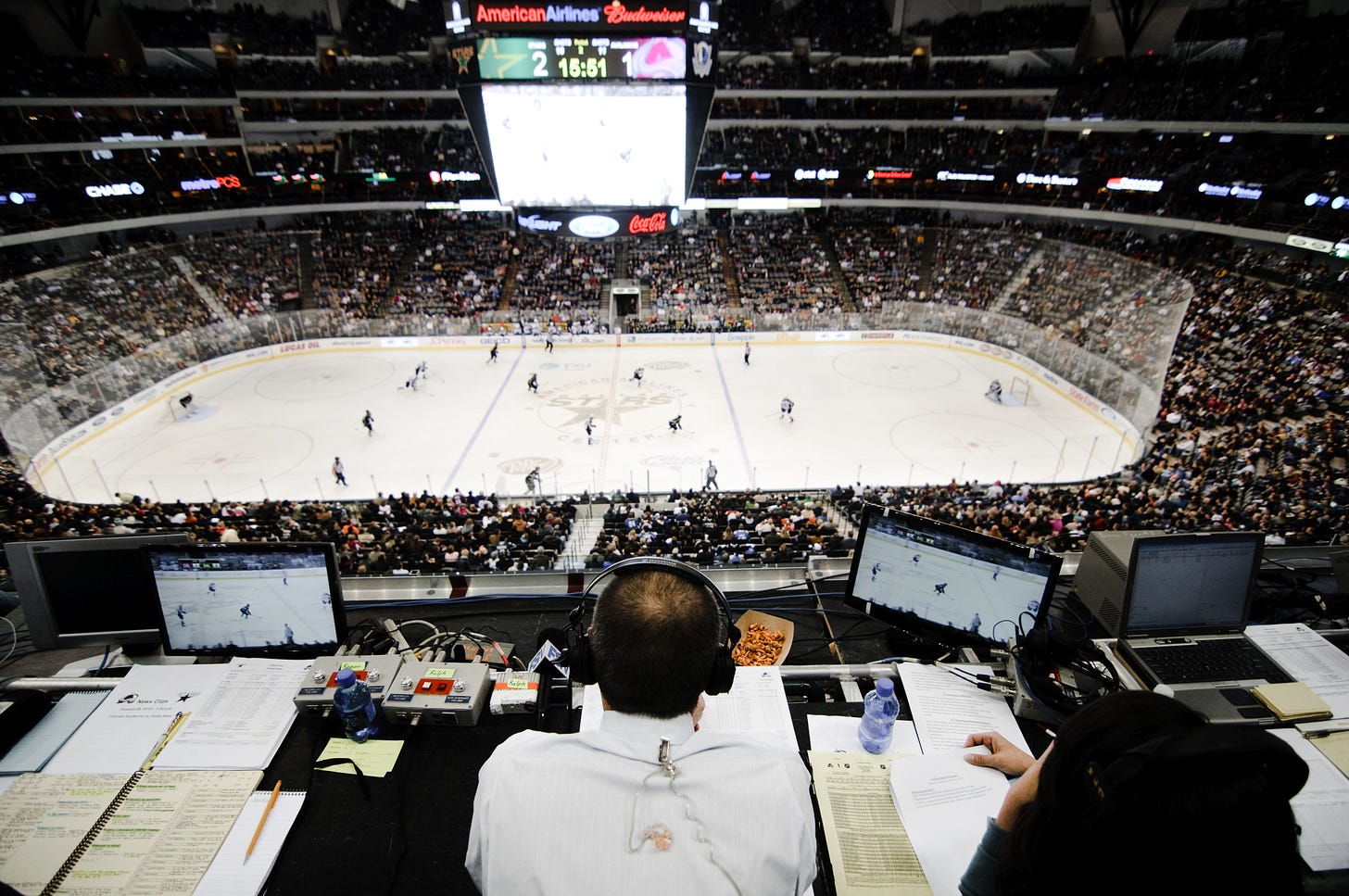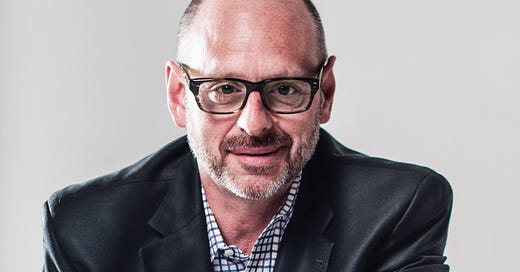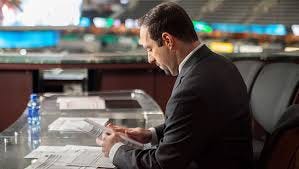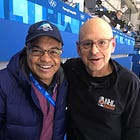Advice for young sports broadcasters - Part 2
My advice on should you get an agent? And on staying where your feet are to get the next gig. Good read for Stars fans and their new "favorite booth".
Continuing Education for Sports Broadcasters
Today we’ll tackle a couple of pretty big subjects in the universe of Sports Broadcasters, keying in on excelling where you are, and the question of representation and advocacy to help get you where you want to go.
A quick review of the Part 1 first - (Access below)
1 - ALWAYS SAY YES - Take every gig - no matter what the sport - no matter what it pays - no matter who it’s for. Saying no closes doors. Saying yes opens you to opportunities, experiences, and people who may be there for you down the road.
2 - NOTHING GETS DONE YOU DON’T PUSH - BE RELENTLESS - be prepared to go through walls or break windows to get an opportunity. Generally speaking, your competition will not. You have to push - push hard - push harder to be noticed and get an interview, audition, or a job.
3 - YOU GOTTA KILL THE JOB YOU HAVE IF YOU WANNA GET THE JOB YOU WANT.
I can’t tell ya how many times I’ve observed people in this business and others implode because they kept looking over the fence at where they wanted to go next, and not focusing on where they are now.
This is self-destructive thinking and behavior. Your employer and coworkers won’t like it and you’ll be unlikely to get much further.
Let me give you a real life example.
I know a young broadcaster who was hired as a radio host for an NHL team. He was talented and sharp, but had some real rough edges. Even for an entry level broadcaster at this position - he needed work. He needed to polish his skills. This was the perfect opportunity - he was around very talented professionals, and almost all of them were willing to give him help and direction.
The trouble was - he kept asking everyone within earshot how he could do play-by-play for an NHL team. He’d say to his co-workers - if anything opens up here or elsewhere - he’s very interested in that. He always had questions about job openings someplace else.
Now - those who had been around were not amused. Here they were trying to help him - and all he wanted to talk about was getting to the highest rung on this particular ladder.
It would have been one thing (but not ideal) if he was crushing his radio hosting duties. He was not. Reports were he was visibly disorganized, many nights unprepared, and not working on any of those shortcomings. His on-air work was not up to the standard and wasn’t getting better.
But - nearly every day he’d still ask. What’s out there? Should I go do AHL hockey? (like that’s a lock…) How do I get to the next level? There are local PXP opportunities for High School sports - should I do that?
Well guess what….??? He didn’t last long and to my knowledge never got another NHL broadcasting opportunity.

Now - let me tell ya about one (of a few) I watched personally who did it absolutely right. And you know him.
A couple of years before I left the Stars booth, I got a call in the summer from former LA Kings PXP guy Bob Miller. He knew this young broadcaster doing hockey PXP in Alaska - and would I find a few minutes to speak with him about his career - etc.
A note here - requests of this kind happen a lot and I’m always really excited to get on the phone with young broadcasters. I still get on these calls very regularly. Send the elevator back down has always been a big priority of mine. I didn’t have so many people around me when I was coming up that I could speak to like this - so that’s part of it too.
I said sure and the next day I was on the phone with one Josh Bogorad, who was extremely professional, respectful, and just a good guy. We spoke at length about what he was doing and what he might want to do going forward. He asked me lots of questions.
Josh, unlike the broadcaster in the first example, had been honing his skills at that level for some time, and was picking brains about what he might need to do to get better, and maybe - get the hell out of Alaska to someplace else.
I left it at - send me your stuff - I’ll give it a listen and give you notes if you want - and stay in touch with me.
He sent me his stuff. And then - something crazy happened. He called me the very next day -
“I hate to bother you but… I noticed the Stars just posted a position for a radio host - what do you know about that?”
I didn’t know anything but of course knew where to find out.
After Josh and I kicked around the question of should he move to host someplace else or stay on the PXP chair at a lower level since he wanted to stay a PXP guy - we landed on - run this down - (like I did when I was trying to get in as detailed in Part 1 of this series) and see what happens. We both were comfortable with the position that being in the NHL - around NHL people - will get him closer to the action.
I remember saying - you never know….
I spoke to Jason Walsh, our show exec producer and VP of broadcast and he listened to Josh’s reel and liked it.
The Stars flew him in for an interview and I picked him up at the airport and took him to dinner that first night. Easy going guy - very good company. I had a great feeling about him right away.
From the day he got there he was the best radio host we ever had. He worked hard at it. He was well-liked. He kept his head down and did the job. I’ve had a hand in helping bring in many people to the organization in roles large and small, but this one I am very proud of and thankful that I was able to help.
After I left - he kept doing that job at a high level. I know him - he never complained I’m positive. And he just kept working hard. TV opportunities came with the Stars because of how he did on the radio. Eventually, events transpired to put him in that seat where he certainly belongs.
And all because he killed the job he had. He never asked me about where he might go next or what other opportunities existed. He just crushed it every day. And he was a great teammate.
The enigmatic Howard Hughes has this great quote - “show me a common stock clerk with hard work and ambition, and I’ll show you the president of the company - show me someone without hard work and ambition - and I’ll show you a common stock clerk.”
4 - “Do you think I should get an agent?”
Boy - if I had a nickel…
I get and got this question often. As recently as last week when I was speaking to a minor league sports broadcaster with an excellent track record and good skills - I got this question.
To cut to the chase - my answer is an emphatic YES.
And there are two specific yet interlocking reasons for doing it. First - an advocate is very helpful - if you can find someone who can not only represent your interests in a negotiation, but help identify and get you in the mix for other opportunities - this is a huge help to you.
Generally speaking - Sports broadcasters, artists, creative types - are not great negotiators or business people. Even if you do have some background here in negotiating contracts - do you want to be in there hearing why they don’t think you’re worth it? Or worse.
Generally speaking - you’re dealing with someone at a team or network level who has lots of experience negotiating contracts. They have more information than you do (on other comparable salaries, etc) and are generally not interested in sharing that with you.
The right agent, if you can find one, will help you with all of these things and potentially more.
When I’ve been on the other side - working with agents to attempt to look at broadcasters to hire - it’s very clear the difference a really good one can make.
For example - I was in a situation a couple of years ago where a team I was working for was looking to audition new broadcast talent in season. There were some big guns in the mix we were looking at.
At one point - I had two PXP guys I wanted in to work a few games. Both were under contract with the same big network. Very similar resumes and skills. Only one of them was able to come in to do on-air audition games - the one with the better agent. The agent got it done.
If these guys were unrepresented - neither would have had a chance.
What should you look for - what should you avoid when getting an agent?
First off - when you’re young and starting - you’re not very attractive to too many big agents - or agents in general. They earn a percentage of what you earn - so - do the math.
The way you can get around this is look for a new agent at an established agency. Somebody hungry like you, but with the power of a big firm behind them. Ask people at or around your level who they have. Network. Work this like it’s a job - because it’s as important as it gets. There are lots of young agents looking for young people to grow with. But you gotta work this hard - this isn’t an easy thing.
When speaking with them - find out what they’ll do and what their track record is with people at your level. Will they simply negotiate the contract? Or - will they advocate for you and help identify opportunities? Do they have relationships with people who make hires? What’s their background and network like?
You want someone who isn’t just looking to add you to the stable and you have to do all the work. I know of plenty of young broadcasters who heard happy horseshit from the agent when they were introduced - but who saw the agent disappear right after the contract was signed and then were stuck.
Find out - who do they represent now and what have they done for them? Who are their hiring contacts? Do they have relationships with people in your area?Ask them hypotheticals - What if I find an opportunity - can you follow up and get me an interview? How much time will you spend actively looking for opportunities for me? What are your goals for me?
Use your friends and colleagues and work to get someone professional and reliable.
Go short on term with the agent - so you can both see what kind of fit this is.
But my boss told me not to get an agent..
Yah. lol. Why do you suppose that is???
Right - your employer rarely wants to give you full value and for some bosses, the threat of not being able to deal with a creative person but a professional negotiator means it might be more expensive, AND they may have to treat you differently.
It is my experience that almost everyone now is used to this - many broadcasters have agents and it’s no big deal. It shouldn’t be. Yes, there are a few old-school lames still out there who are insecure or mercurial - you know - assholes - who don’t want to be challenged, but they’re fading out.
Mostly, good professionals accept that this is best for everyone.
There’s a layer of protection for both sides - the broadcaster doesn’t have to hear first-hand how inadequate they are - how over paid they are already - how little they’re actually worth - or how lucky they are to be in there at all. The broadcaster can focus on doing his job. Management doesn’t have to engage with the employee directly on things that aren’t in the employees day-to-day job description - like negotiating contracts and risk the whole dynamic coming apart or residual bad feelings from either side following the negotiation.
So - do your homework - but find a good one who can help advocate for you, have your back, and negotiate the best deal possible. Because nobody else in this business or in these dynamics will have your back.
Final Thoughts
To recap the first 2 installments -
1 - ALWAYS SAY YES
2 - NOTHING GETS DONE YOU DON’T PUSH - BE RELENTLESS
3 - IF YOU DON’T KILL THE JOB YOU HAVE - YOU’LL NEVER GET THE JOB YOU WANT
AND - 4 - GET AN AGENT
I’m available to answer any questions from any young broadcaster. Leave me a note here - or email me at senselessralph@gmail.com -
Please pass this on to anyone you think would be interested in the advice here or in speaking with me directly.
CONTINUE READING…









Ralph, this is great stuff and fantastic advice. Thank you for taking the time to write both parts, I've sent this to a few friends already, you're doing great work paying it forward. Appreciate you!